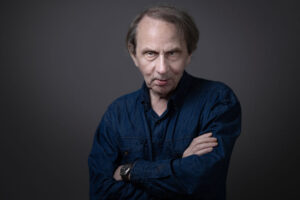Almost anywhere in the world, you would have confidently expected people to celebrate their country overtaking Japan, the UK and Germany, to clock more millionaires than everywhere else except the United States and China.
Not in France, though. Accusations flew, thick and vicious. “France’s historic strength was its social model, withstanding all crises, and its level of inequalities, which is among the narrowest in the world’s rich countries. No longer! The Emmanuel Macron-imposed Americanisation of France is here to stay,” tweeted Sandrine Rousseau, the Green MP who never misses an opportunity to burnish her hard-Left credentials. Marine Tondelier, leader of France’s other green party (EELV), had already bellowed that she was dreaming of a “France without billionaires” or “vampires”. And needless to say, l’Humanité, the once-powerful daily of the French Communist Party, ranted that this was “logical” when tax fraud in France subtracted “between €80 and 100 billion” from the national budget.
But such criticism is shared to a significant extent on the Right. There are 35% of National Rally voters who agree with Ms Tondelier on this particular question (and not much else). Overall, 38% of the French say they would be happier living in a country without rich citizens. This prompts the centre-Right Le Point to a probably too optimistic headline: “No, the French are not dreaming of a France without billionaires”. Except almost 40% do.
Last January, Philippe Martinez, the then-leader of the CGT union, suggested that electricians and gas engineers should “visit billionaires’ beautiful houses” to “cut off their power and gas lines”. (This was no idle command: almost 20 years ago, two masked members of the same union entered Prime Minister Jean-Pierre Raffarin’s private home in western France and did just that to protest against the part-denationalisation of EDF, the then State-owned national power utility.) That kind of Robin Hood-style, mock-revolutionary gesture is appreciated enough in France that the PM’s militant (de)electricians, salaried by the State, were never disciplined, either by the French justice system or by sanctions at their workplace.
Money, to the French, is dirty — in a way sex isn’t. (Until Dominique Strauss-Kahn sabotaged his own presidential bid in 2011 by molesting a New York hotel maid, Paris wisdom had it that no one could blackmail a politician with sex revelations as the reaction would most likely be our typical Gallic shrug). But money controversies kill your career for good. When the popular Gaullist Bordeaux Mayor, Leader of the National Assembly, Jacques Chaban-Delmas, was revealed by Le Canard Enchaîné, France’s equivalent to Private Eye, not to have paid income tax between 1967 and 1970, it did not matter that he had simply applied the tax law that allowed shareholders to deduct already-paid dividend levies from their income tax total. Chaban, once predicted to become France’s next president, vanished from the scene in lasting disgrace.
Regularly, Left-wing dailies like Libération, but also sovereignist outfits like Marianne, a Eurosceptic and anti-globalist opinion weekly, indulge in two-minute-hate front pages abusing “the rich”. Their favourite piñata is Bernard Arnault, the LVMH luxury conglomerate supremo, who, depending on who’s counting, is either the richest or the second-richest man in the world. Arnault’s companies — Louis Vuitton, Dior, Givenchy, Moët & Chandon, Hennessy and many more — depend on the exclusive “Made in France” label for a good part of their prestige, and therefore Arnault employs, directly or indirectly, 160,000 people in his own country.
The luxury sector brings in more cash into the French economy than the combined aerospace and armaments industries. And the “vampire” Arnault, and his companies, pay taxes in France. But none of this lets him off the hook in the eyes of les citoyens. “Fuck off, rich berk!” blared a 2012 Libération cover at the news that Arnault was reacting to newly-elected Socialist president François Hollande promise of a 75% top tax bracket (for income above one million euros) by moving to Belgium. The tax, which also prompted the departure of actor Gérard Depardieu, as well as a number of footballers, was quietly dropped a year and a half later, having, quelle surprise, produced meagre returns for the French Treasury. Arnault, who had acquired a Belgian passport, came back.
It is significant that even in the overt expression of the French age-old hatred of the rich, the footballers, unlike Arnault, were not targeted. The French hate the rich, but they have a precise image of what they look like: their bosses, their landlords, their bankers — a series of clichés belonging to both the Biblical (“Ye cannot serve two masters… God and Mammon”) and Marxist vernaculars. However secular it sees itself, France has absorbed the worldview of both the Catholic Church and of Das Kapital. Football gains, however, are seen here as the result of a fluke — quasi-magic money paid to some working-class boys for their unpredictable talent.
The man who convinced François Hollande to drop his fruitless tax rate was his 37-year-old almost unknown economy minister, one Emmanuel Macron. When he became Hollande’s successor, Macron earned within days the sobriquet of “Le président des ultra-riches” for having mostly cancelled France’s four decades-old wealth tax.
Interwoven through the resentment is anti-Americanism, which is being increasingly used as an ideological shortcut on both sides of the aisle. Today, great chunks of the French Right, in particular, consider America as a particularly noxious Mammon, spreading unfettered capitalism and destroying the fabric of society and culture. In modern French politics, the return of Charles de Gaulle to power in 1958 is deemed to be the turning point in relations. Conventional wisdom on wartime experiences notes that while de Gaulle and Winston Churchill understood and respected one another, Franklin D. Roosevelt detested the French leader and tried to sideline him at every turn. But to pin it here would be to miss the Catholic-infused anti-Americanism on the Right throughout the 19th century, best exemplified by Charles Maurras, the Action Française ideologue and leader — who informed part of de Gaulle’s patriotism in the Twenties and Thirties.
Before Sandrine Rousseau’s accusations against Emmanuel Macron, Nicolas Sarkozy was early on called “L’Américain”, which was not a compliment. He was also “le Président des Riches”, a term coined by a couple of sociologists in the Bourdieu tradition, the late Michel Pinçon and his wife Monique Pinçon-Charlot. Over 35 years, from academics specialising in class differences, the Pinçons morphed into the premier national hounders of the rich, with an increasingly accusatory series of books (27 at last count) on their explorations into the upper reaches of the French bourgeoisie. After a couple of documentaries on the same subject, Monique, the daughter of a public prosecutor in Mende, a small town in Lozère in South-Central France, channelling her father, has become the face of France’s rejection of money and the affluent classes.
She would have approved of one of France’s most inventive anti-rich taxes, the 1893 impôt sur les pianos, that created a tax on an instrument considered to only be affordable by the rich. The unintended consequence (as for many taxes) was the wanton destruction of thousands of pianos, including some historic ones on which Chopin and Liszt had played, in order to avoid the tax.
The politics of envy has always worked well in France, a country where ostentatious fortune was the surest way to be cut down to size, literally during the French Revolution. From the hounding of the Knights Templar by King Philippe le Bel in 1307, who coveted the riches of the Order, to the denunciations of Protestants that led to the 1572 St Bartholomew’s Day (and weeks, and months) Massacre to the lifetime imprisonment of Nicolas Fouquet, the young Louis XIV’s Finance Minister, for giving a too sumptuous party for the King, the idea that money is always ill-gotten has existed in France for centuries, and nothing is going to shake it.
Disclaimer
Some of the posts we share are controversial and we do not necessarily agree with them in the whole extend. Sometimes we agree with the content or part of it but we do not agree with the narration or language. Nevertheless we find them somehow interesting, valuable and/or informative or we share them, because we strongly believe in freedom of speech, free press and journalism. We strongly encourage you to have a critical approach to all the content, do your own research and analysis to build your own opinion.
We would be glad to have your feedback.
Source: UnHerd Read the original article here: https://unherd.com/



